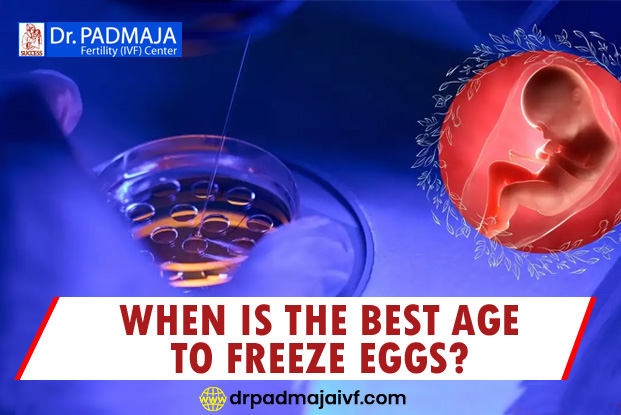Egg freezing, or oocyte cryopreservation, is a growing trend among women who want to delay starting a family or preserve their fertility due to personal, professional, or medical reasons. However, understanding the optimal age for freezing eggs is crucial to maximizing their quality and future success. Let’s explore when is the best time to freeze eggs and why age plays such a critical role in this process.
Why Age Matters in Egg Freezing
Egg freezing involves retrieving and preserving a woman’s eggs while they are still at their best quality. This process allows women to store their eggs for future use when they are ready to conceive. The effectiveness of egg freezing is significantly influenced by the age at which the eggs are collected. Here’s why:
Egg Quality and Quantity: Women are born with a finite number of eggs, and both their quantity and quality decline as they age. By the time a woman reaches her mid-30s, the rate of egg loss accelerates, and the remaining eggs are often of lower quality. Freezing eggs in your late 20s or early 30s generally means they will be healthier and more viable, increasing the chances of successful fertilization and pregnancy later.
Fertility Trends: Fertility is typically at its peak in a woman’s 20s and early 30s. During this period, eggs are generally of better quality and have higher chances of leading to successful pregnancies. As a woman ages, the risk of chromosomal abnormalities in the eggs increases, which can impact the success rates of conception and healthy pregnancies.
Future Flexibility: Many women today choose to delay starting a family due to career aspirations, personal goals, or other reasons. Egg freezing provides an opportunity to preserve fertility and offer more flexibility in family planning. By freezing eggs at a younger age, women can better manage their reproductive timeline.
Ideal Age for Egg Freezing
The best age to freeze eggs is typically in your late 20s to early 30s. Here’s a closer look at why this age range is considered optimal:
Late 20s: Freezing eggs in your late 20s is often considered ideal because, at this age, eggs are generally in their prime. Women in their late 20s typically have a higher number of high-quality eggs, which can lead to better success rates when the eggs are eventually used for conception.
Early 30s: If you missed the window in your late 20s, early 30s is still a good time to freeze eggs. Although the quality of eggs begins to decline more noticeably after age 35, freezing eggs in your early 30s still offers a higher likelihood of success compared to freezing eggs at an older age.
Mid-30s and Beyond: While it is still possible to freeze eggs after age 35, the success rates may not be as high. Women over 35 may experience reduced egg quality and quantity, which can impact the outcomes of fertility treatments. If you are considering freezing eggs in your mid-30s or later, it’s important to have a detailed discussion with a fertility specialist to understand your options and chances of success.
Factors Affecting Egg Freezing Decisions
Several factors can influence the timing of egg freezing, including:
Medical Conditions: Women undergoing treatments that may affect fertility, such as chemotherapy for cancer, should consider freezing eggs before starting their treatment. This can help preserve their fertility and provide future reproductive options.
Personal and Professional Goals: If you are focusing on career development or other personal goals, freezing eggs earlier can provide peace of mind and flexibility in your future family planning.
Reproductive Health: If you have any known reproductive health issues, such as polycystic ovary syndrome (PCOS) or endometriosis, it’s important to consult with a fertility specialist. They can help assess your individual situation and determine the best time to freeze eggs based on your reproductive health.
Choosing the Right Fertility Center
Selecting a reputable fertility center is crucial for successful egg freezing. In Hyderabad, the Dr. Padmaja IVF Center stands out as one of the best IVF centers, known for its expertise and advanced technologies. At the Dr Padmaja Fertility Center, you can expect personalized care and state-of-the-art procedures to ensure the best possible outcomes.
Dr. Padmaja IVF Center offers comprehensive consultations to evaluate your fertility and provide tailored recommendations for egg freezing. With a dedicated team and advanced facilities, Dr Padmaja Fertility Center is committed to supporting you through every step of the egg freezing process, from initial consultation to egg retrieval and storage.
The Egg Freezing Process
Here’s what to expect during the egg freezing process at a top fertility center:
Initial Consultation: Discuss your fertility goals and health history with a specialist. They will evaluate your individual situation and recommend the best approach for egg freezing.
Ovarian Stimulation: You will undergo hormone treatments to stimulate your ovaries to produce multiple eggs. This step is crucial for obtaining a sufficient number of high-quality eggs.
Egg Retrieval: When the eggs are ready, a small amount of surgery is done to remove them. This is typically done under sedation, and most women recover quickly.
Freezing and Storage: The retrieved eggs are then frozen using advanced cryopreservation techniques and stored for future use.
Conclusion
The best age to freeze eggs is generally in your late 20s to early 30s, when egg quality and quantity are at their peak. By freezing eggs at this optimal time, you can enhance your chances of successful conception and healthy pregnancies in the future. If you’re in Hyderabad, the Dr. Padmaja IVF Center offers top-notch facilities and expert care for women considering egg freezing. Consulting with a specialist at Dr Padmaja Fertility Center can help you make informed decisions and achieve your reproductive goals with confidence.When Is the Best Age to Freeze Eggs?
Frequently Asked Questions (FAQS)
What is the best age to freeze eggs?
The best age to freeze eggs is typically in your late 20s to early 30s. This is when egg quality is at its peak, providing the highest chances of success for future fertility treatments.
Why is freezing eggs in your 20s or early 30s ideal?
Egg quality and quantity start to decline after age 35. By freezing your eggs earlier, you are preserving healthier eggs, which may increase the chances of a successful pregnancy later in life.
Can I freeze my eggs after 35?
Yes, you can freeze eggs after 35, but the success rates may be lower as egg quality and quantity decrease with age. It’s important to consult a fertility specialist to assess your specific situation.
Is there a minimum or maximum age for egg freezing?
There is no strict minimum age, though it’s rare to freeze eggs before your mid-20s unless for medical reasons. Most fertility clinics have an upper age limit, typically around 40-42 years, as egg quality significantly diminishes after this age.
Does age impact the success of using frozen eggs?
Yes, the age at which eggs are frozen directly impacts success rates. Eggs frozen at a younger age are of better quality and more likely to result in a healthy pregnancy when used later.
About The Author :

If Dr. Padmaja Divakar Is A Public Figure Or A Professional In A Specific Field, I Recommend Checking Her Official Website, Professional Profiles, Or Reliable Online Sources For The Most Up To Date And Accurate Information About Her Background, Qualifications, And Achievements.

